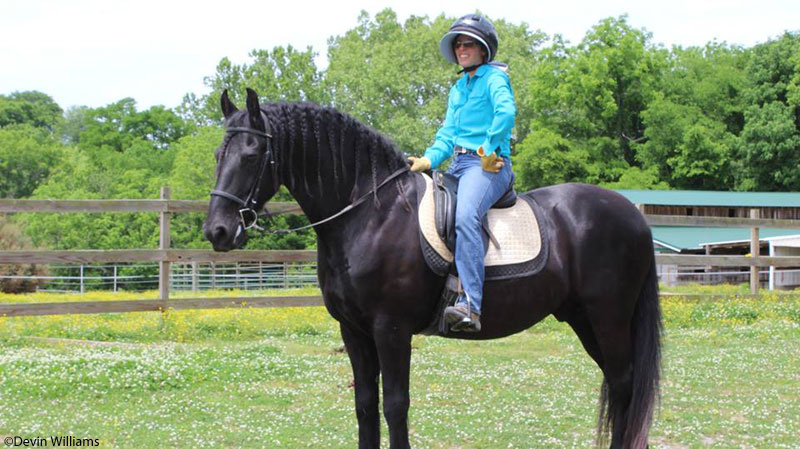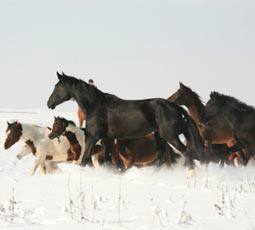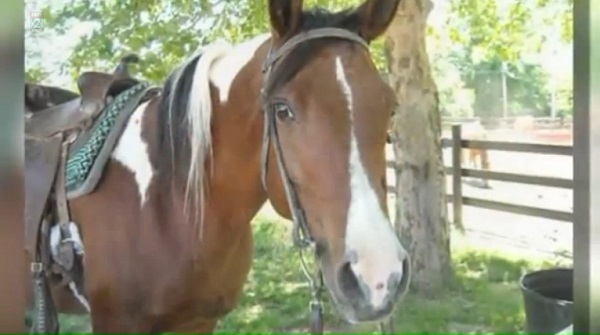
The author with one of her equine teacher/students. Photo: Devin Williams
As a trainer I began my career focusing on what I could teach horses, yet as my understanding grew I found that true training is a two-way street. Horses teach us as much, or even more, than we teach them. I have learned how to be a better trainer by being attentive to the lessons the horses have taught me through the years. These lessons are countless but here are those I’ve found most valuable.
Patience
Horses have taught me to be patient with them as well as with myself. If a horse is pushed too quickly beyond his physical or emotional capabilities, his progress will come to a halt or head in the opposite direction. When I have been impatient, I am working against the horse instead of with the horse. I now know that the work will feel effortless when I am working with the horse at his comfortable pace.
Empathy
Years ago I worked with a Arabian gelding that could not focus for more than two-seconds at a time. I was constantly trying grab his attention. As I nagged he became more frustrated and I became more forceful. Though I was using methods I had successfully used in the past, this particular horse wasn’t interested in following my program. Eventually I realized my approach wasn’t taking the horse into consideration at all. This horse was easily distracted because he was scared. He was frightened by what was going on around him but without the skills to deal with his anxiety he couldn’t relax. Once I understood his feelings, our work together became productive and a joy. I credit this particular horse with my current direction as a trainer, helping each horse to be relaxed and receptive during the training process.
Compassion
I want a horse to give me his all. For this to happen I realize that I need to give my all in return. This means that I provide: comfortable and suitable tack; clear communication; proper diet; well-maintained feet; regular dental care; and adequate conditioning for the work. Above all I am aware of a horse’s inherent capabilities, his strengths and limitations. I measure success only when he has reached his athletic potential in a way that is emotionally and physically beneficial and not in any way injurious.
Confidence
Horses need to feel secure in themselves to be capable of performing on the ground and under saddle and for your safety as well. This confidence is achieved when a horse trusts the human who’s handling him. Horses are genetically preprogrammed to run or fight when they feel threatened, so they rely on us to guide them through the maze of distractions and sensations they encounter. We also ask them to carry out tasks they wouldn’t otherwise do. A horse is certain he can do what is asked of him when he feels comfortable and safe. He shows his confidence with a ready and willing demeanor. By being a calm and supportive leader, I show him that I have his back and that he’s safe with me, thus confidence is achieved not by expectation but by example.
Learning something new each and every day
This is what I love most about horses. I know I can never learn it all, but I cherish every new insight. They allow me to better connect with and help the horses I train – my way of giving back to them for all they have given me.
Liked this article? Here are others you’ll love:
Lessons from Ruby
10 Things Your Trainer Wants You to Know





I hear you!
Should be six…Love!!
yes, this is so true!
Yes, please consider LOVE #6! Horses are all about love.
Thank you for the comments and feedback. 🙂
Dale, I was wondering if you could tell me more specifically how you helped that Arab to be more relaxed and focused on you? I am working with an Arab mare right now who also gets distracted and scared often and would love to hear what actions you took to help with that?
I second Julie and would love to hear more about how you worked with the scared Arab. My mini mare is focused and works well at home but as soon as she’s at a show she can’t focus (even if she’s shown in that arena before). Perhaps she just needs time but I haven’t had these issues with horses in the past. Thanks in advance!
Ladies,
I’m not sure what I-5’s policy is on responding to questions on their website, so to play it safe please contact me through my website Un-NaturalHorsemanship.com or Unnatural Horsemanship FB page. Thanks!!
With 55+ years training all disciplines and giving lessons (and daughter of a trainer who started Wash. State Horsemen, Inc.with two other and its first president), the best lessons I’ve learned over the years have been from the horsed. I TOTALLY AGREE WITH HER FIVE points!
Ia agree with Dale and thank her for a great article. Patience and compassion are most important, and before then, imprinting a young horse as well as winning his trust before saddling up will save time and effort. Once a horse learns something, there’s no need to repeat, just thank him and give him time to rest. One day and one lesson at a time. Horses dont forget. next day just repeat and teach a new thing. even if it only takes 5 minutes or 1 hour. once he learns, it’s reward time. He will learn faster everyday.
I am a Paso Fino horse breeder and director of the Puerto RIco Equestrian Art School.